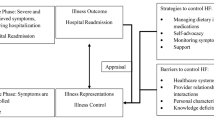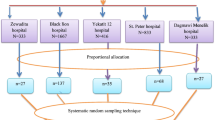Abstract
Aim
This study aimed to explore the experiences of readmitted heart failure (HF) patients towards managing their medical problems and to identify factors influencing their adherence to medications.
Subject and methods
A qualitative exploratory study was conducted among HF patients who were admitted to Penang General Hospital, Malaysia. A purposive sample of 15 male and 5 female patients of various ethnic groups were interviewed using a semi-structured interview guide. The interviews were audiotaped and transcribed verbatim for thematic content analysis.
Results
The interviewed patients were generally disturbed by the deterioration in physiological function due to HF. They were aware of the importance of taking HF medications and control of fluid intake but not sodium intake. However, the participants still needed more clarification on ways to reduce sodium intake and improve adherence to lifelong medications and diet. The respondents identified individualized patient self-care, disease, and medication counseling that empower patients to monitor their own body condition to enhance adherence. Barriers identified were limited communication with health care practitioners, lack of correct information about medications and HF, difficulty in remembering, complexity of regimens, and lack of compelling HF symptoms.
Conclusion
The present study has identified empowerment of patients in decision making as the main facilitator to improve adherence. These findings suggest that there is a need for doctors and pharmacists to broaden their involvement in exploring and shaping individual patient’s beliefs regarding HF and its management in order to achieve successful treatment outcomes.
Similar content being viewed by others
References
Lopez AD (1993) Assessing the burden of mortality from cardiovascular diseases. World Health Stat Q 46:91–96
Bennett S, Cordes DK, Westmoreland G, Castro R, Donnelly E (2000) Self-care strategies for symptom management in patients with chronic heart failure. Nurs Res 49:139–145
Borer A, Gilad J, Meydan N, Riesenberg K, Schlaeffer F, Alkan M, Schlaeffer P (2001) Impact of active monitoring of infection control practices on deep sternal infection after open-heart surgery. Ann Thorac Surg 72:515–520
Bosworth HB, Steinhauser KE, Orr A, Lindquist JH, Grambow SC, Oddone EZ (2004) Congestive heart failure patients’ perceptions of quality of life: the integration of physical and psychosocial factors. Aging Ment Health 8:83–91
Brännström M, Ekman I, Norberg A, Boman K, Strandberg G (2006) Living with severe chronic heart failure in palliative advanced home care. Eur J Cardiovasc Nurs 5:295–302
Chin SP, Sapari S, How SH, Sim KH (2006) Managing congestive heart failure in a general hospital in Malaysia. Are we keeping pace with evidence? Med J Malaysia 61:278–283
Chong AY, Rajaratnam R, Hussein N, Lip GY (2003) Heart failure in a multiethnic population in Kuala Lumpur, Malaysia. Eur J Heart Fail 5:569–574
Cole JA, Norman H, Weatherby LB, Walker AM (2006) Drug copayment and adherence in chronic heart failure: effect on cost and outcomes. Pharmacotherapy 26:1157–1164
Europe E, Tyni-Lenné R (2004) Qualitative analysis of the male experience of heart failure. Heart Lung 33:227–234
Evangelista LS, Berg J, Dracup K (2001) Relationship between psychosocial variables and compliance in patients with heart failure. Heart Lung 30:294–301
Freund T, Wensing M, Mahler C, Gensichen J, Erler A, Beyer M, Gerlach F, Szecsenyi J, Peters-Klimm F (2010) Development of a primary care-based complex care management intervention for chronically ill patients at high risk for hospitalization: a study protocol. Implement Sci 5:70
Heo S, Lennie TA, Moser DK, Okoli C (2009) Heart failure patients’ perceptions on nutrition and dietary adherence. Eur J Cardiovasc Nurs 8:323–328
Jaarsma T, Dracup K, Walden J, Stevenson LW (1996) Sexual function in patients with advanced heart failure. Heart Lung 25:262–270
Jaarsma T, Strömberg A, Mårtensson J, Dracup K (2003) Development and testing of the European Heart Failure Self-Care Behaviour Scale. Eur J Heart Fail 5:363–370
Lycholip E, Celutkiene J, Rudys A, Steponenieni R, Laucevicius A (2010) Patient education significantly improves quality of life, exercise capacity and BNP level in stable heart failure patients. Acta Cardiol 65:549–556
Murray MD, Birt JA, Manatunga AK, Darnell JC (1993) Medication compliance in elderly outpatients using twice-daily dosing and unit-of-use packaging. Ann Pharmacother 27:616–621
Nikolaus T, Kruse W, Bach M, Specht-Leible N, Oster P, Schlierf G (1996) Elderly patients’ problems with medication. An in-hospital and follow-up study. Eur J Clin Pharmacol 49:255–259
Pais P, Pogue J, Gerstein H, Zachariah E, Savitha D, Jayprakash S et al (1996) Risk factors for acute myocardial infarction in Indians: a case-control study. Lancet 348(9024):358–363
Paradis VR, Cossette S, Frasure-Smith N, Heppell S, Guertin MC (2010) The efficacy of a motivational nursing intervention based on the stages of change on self-care in heart failure patients. J Cardiovasc Nurs 25:130–141
Pound P, Britten N, Morgan M, Yardley L, Pope C, Daker-White G et al (2005) Resisting medicines: a synthesis of qualitative studies of medicine taking. Soc Sci Med 61:133–155
Proctor E, Morrow-Howell N, Li H, Dore P (2000) Adequacy of home care and hospital readmission for elderly congestive heart failure patients. Health Soc Work 25:87–94
Reddy KS, Yusuf S (1998) Emerging epidemic of cardiovascular disease in developing countries. Circulation 97(6):596–601
Riegel B, Carlson B (2002) Facilitators and barriers to heart failure self-care. Patient Educ Couns 46:287–295
Sandelowski M (2000) Whatever happened to qualitative description? Res Nurs Health 23:334–340
Smith F (2002) Qualitative interviews. Research methods in pharmacy practice. Pharmaceutical Press, London
Strömberg A, Broström A, Dahlström U, Fridlund B (1999) Factors influencing patient compliance with therapeutic regimens in chronic heart failure: a critical incident technique analysis. Heart Lung 28:334–341
Teh BT, Lim MN, Robiah A, Azman W, Thuraisingham S (1999) Heart failure hospitalizations in Malaysia. J Card Fail 5(3 Suppl):1
Thom T, Haase N, Rosamond W, Howard VJ, Rumsfeld J, Manolio T et al (2006) Heart disease and stroke statistics—2006 update: a report from the American Heart Association Statistics Committee and Stroke Statistics Subcommittee. Circulation 113: e85-e151
Watson J, Royle J (1988) Watson’s medical-surgical nursing and related physiology. Beilliére Tindall, London
World Health Organization (2009) The atlas of heart disease and stroke. Available via http://www.who.int/cardiovascular_diseases/resources/atlas/en/. Accessed 13 Mar 2009
Wu JR, Moser DK, Lennie TA, Peden AR, Chen YC, Heo S (2008) Factors influencing medication adherence in patients with heart failure. Heart Lung 37:8–16
Zambroski CH, Moser DK, Bhat G, Ziegler C (2005) Impact of symptom prevalence and symptom burden on quality of life in patients with heart failure. Eur J Cardiovasc Nurs 4:198–206
Zielstorff RD (2003) Controlled vocabularies for consumer health. J Biomed Inform 36:326–333
Conflict of interest
The authors declare that they have no conflict of interest.
Author information
Authors and Affiliations
Corresponding author
Appendix 1: Themes identified
Appendix 1: Themes identified
1.0 Impact of disease on daily life
1.1 Impact on daily routine and quality of life (QOL)
1.2 Impact on work/career
2.0 Perception and knowledge of the roles of medicine in controlling HF
2.1 Knowledge on importance of taking medication
2.2 Difficulty faced by the participant in taking lifelong medications
2.3 Issues related to side effects
2.4 Information needs on adverse drug reaction of medication
3.0 Control of fluid and salt intakes
3.1 Measure taken to control fluid intake
3.2 Difficulty in controlling fluid intake
4.0 Facilitators to enhance adherence
4.1 Understanding symptoms of HF, perceiving physical symptoms, and recognizing those symptoms as symptoms of HF
4.2 Effectiveness of the drugs
4.3 The desire to survive
4.4 Supportive family and reassurance on benefit of medicine by health care practitioner
4.5 Preference for modern medicine versus traditional medicine
4.6 Habitual routine and location of medications
5.0 Barriers to enhance adherence
5.1 Limited communication with health care practitioners
5.2 Lack of correct information about medications and HF
5.3 Difficulty in remembering
5.4 Complexity of regimens
5.5 Lack of compelling symptoms
Rights and permissions
About this article
Cite this article
Ming, L.C., Hassali, M.A., Shafie, A.A. et al. Perspectives of heart failure patients in Malaysia towards medications and disease state management: findings from a qualitative study. J Public Health 19, 569–577 (2011). https://doi.org/10.1007/s10389-011-0415-5
Received:
Accepted:
Published:
Issue Date:
DOI: https://doi.org/10.1007/s10389-011-0415-5




